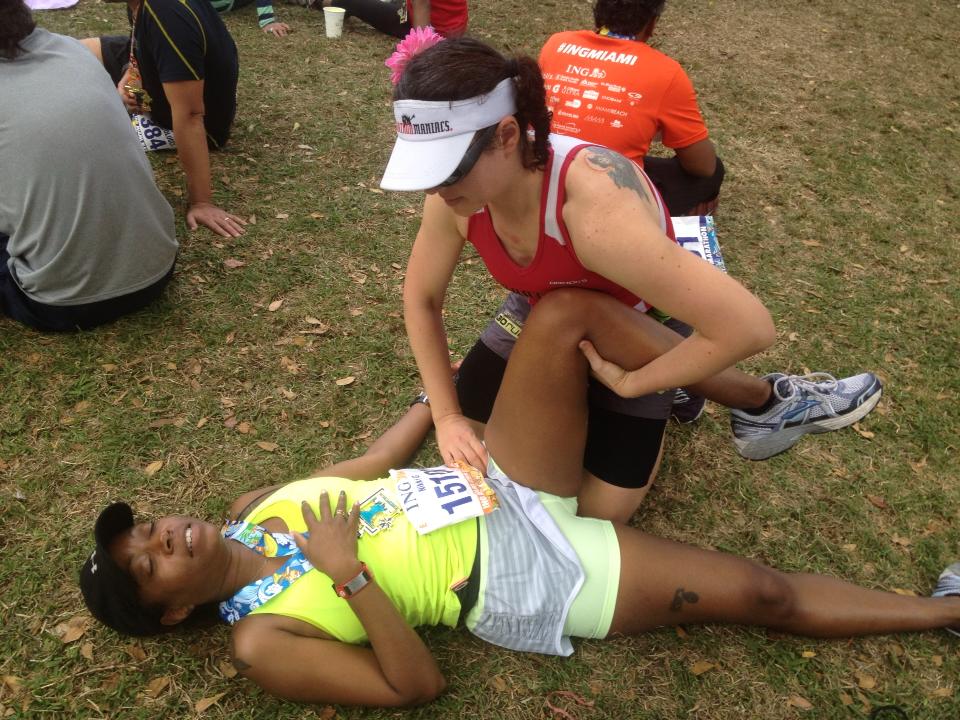
Preparing for a marathon is no small feat.
If you’re in the thick of marathon training, you already know just how much goes into priming your body and mind leading up to race day. Effective marathon training requires close attention to diet, hours of running, and ongoing maintenance of your muscles, joints, and overall health. Whether or not you prioritize these types of self-care can make or break your performance the day-of.
That’s why we recommend every marathon runner incorporate massage into their training. As you prepare your body and mind for optimal performance, massage should be an essential component in your conditioning and recovery.
Let’s explore why.
Massage conditions muscles and joints.
Running is incredible for your overall health, but marathon training is also hard on your muscles and joints. Research shows massage helps to improve muscle strength and care for joints as they’re constantly taxed during training. It’s the science behind why massage is beneficial for those with arthritis and other joint-related illnesses.
Massaging areas of the body near stiff or arthritic joints improves circulation and reduces inflammation. This enhanced blood flow reduces pain and improves range of motion. And once moving becomes easier, you can increase activity levels—lowering your chances of becoming sedentary, stiff, and in pain again.
If you’re in the midst of training for a marathon, triathlon, or other athletic event, massage may be just what you need to maintain muscle and joint health.
Massage decreases stress.
When you’re training for a marathon, you may experience a couple different forms of stress. It’s possible you feel psychological stress from the upcoming race or worries over everyday life. Your body is also undergoing immense physical stress from repeated workouts and movement. Fortunately, massage addresses both types of stressors.
As you train and experience the stress of daily life, cortisol rises. When you receive a massage, cortisol decreases and your body releases the feel-good hormones, serotonin and dopamine. This is one reason you feel relaxed, calm, and perhaps even sleepy after a massage.
Massage may help prevent or improve running injuries.
Are tight hamstrings holding you back from progression? Are sore hips preventing you from a full range of motion while running? Massage therapy addresses these types of running injuries, while helping to prevent new ones.
Why? Regular massages are key in increasing flexibility and improving performance. Massage sends blood flow to areas where your massage therapist applies pressure and movement, freeing up mobility within your muscles and joints. This, in turn, not only improves your running performance, but also prevents injuries that occur without proper maintenance.
For this reason, we encourage runners to seek regular Sports Massage. Like other massages, sports massage manipulates soft tissues, including tendons, ligaments, muscles and fascia. But it goes a step further by incorporating deep tissue work, assisted stretching, and other anti-inflammatory techniques. During a sports massage, your therapist will evaluate your flexibility and tension levels. Then, you’ll work through a series of guided stretches to reduce muscle tension and increase range of motion.
The targeted approach greatly improves overall function and reduces your chance for future injuries.
Massage reduces inflammation and aids in body recovery.
If you’ve ever felt puffy or swollen after intense training, there’s a reason why.
Most strenuous activity—especially intense exercise like marathon training—causes temporary inflammation within the body. When you work your muscles during heavy exercise, it causes micro-tears and a build-up of lactic acid. If your workout is intense, you may require energy production faster than your body can deliver oxygen. Consequently, it relies on lactic acid for fuel during strenuous activity, and eventually fatigues. This, in addition to the damaged micro-fibers, leads to muscle soreness and inflammation.
You might not only feel swollen after a long run, but also experience painful muscle cramps or spasms. This is a sign your body is inflamed. Eventually as you recover, the microtears will rebuild to form stronger muscles—but not without proper nutrition, rest, and care. Fortunately for athletes, massage is scientifically proven to reduce inflammation.

